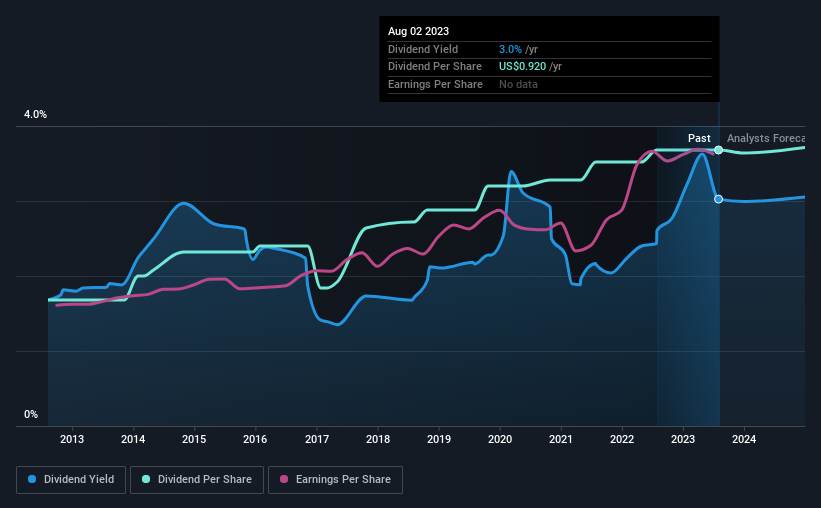First Mid Bancshares (NASDAQ:FMBH) Has Announced A Dividend Of $0.23
First Mid Bancshares, Inc. (NASDAQ:FMBH) has announced that it will pay a dividend of $0.23 per share on the 1st of September. This means that the annual payment will be 3.0% of the current stock price, which is in line with the average for the industry.
While the dividend yield is important for income investors, it is also important to consider any large share price moves, as this will generally outweigh any gains from distributions. Investors will be pleased to see that First Mid Bancshares' stock price has increased by 31% in the last 3 months, which is good for shareholders and can also explain a decrease in the dividend yield.
Check out our latest analysis for First Mid Bancshares
First Mid Bancshares' Earnings Will Easily Cover The Distributions
While it is always good to see a solid dividend yield, we should also consider whether the payment is feasible.
Having distributed dividends for at least 10 years, First Mid Bancshares has a long history of paying out a part of its earnings to shareholders. Based on First Mid Bancshares' last earnings report, the payout ratio is at a decent 25%, meaning that the company is able to pay out its dividend with a bit of room to spare.
Over the next year, EPS is forecast to fall by 3.8%. But if the dividend continues along the path it has been on recently, we estimate the future payout ratio could be 28%, which would be comfortable for the company to continue in the future.
Dividend Volatility
Although the company has a long dividend history, it has been cut at least once in the last 10 years. Since 2013, the annual payment back then was $0.42, compared to the most recent full-year payment of $0.92. This works out to be a compound annual growth rate (CAGR) of approximately 8.2% a year over that time. A reasonable rate of dividend growth is good to see, but we're wary that the dividend history is not as solid as we'd like, having been cut at least once.
The Dividend Has Growth Potential
With a relatively unstable dividend, it's even more important to see if earnings per share is growing. We are encouraged to see that First Mid Bancshares has grown earnings per share at 8.9% per year over the past five years. With a decent amount of growth and a low payout ratio, we think this bodes well for First Mid Bancshares' prospects of growing its dividend payments in the future.
We Really Like First Mid Bancshares' Dividend
Overall, we think that this is a great income investment, and we think that maintaining the dividend this year may have been a conservative choice. The distributions are easily covered by earnings, and there is plenty of cash being generated as well. If earnings do fall over the next 12 months, the dividend could be buffeted a little bit, but we don't think it should cause too much of a problem in the long term. All in all, this checks a lot of the boxes we look for when choosing an income stock.
Investors generally tend to favour companies with a consistent, stable dividend policy as opposed to those operating an irregular one. At the same time, there are other factors our readers should be conscious of before pouring capital into a stock. Taking the debate a bit further, we've identified 1 warning sign for First Mid Bancshares that investors need to be conscious of moving forward. Looking for more high-yielding dividend ideas? Try our collection of strong dividend payers.
Have feedback on this article? Concerned about the content? Get in touch with us directly. Alternatively, email editorial-team (at) simplywallst.com.
This article by Simply Wall St is general in nature. We provide commentary based on historical data and analyst forecasts only using an unbiased methodology and our articles are not intended to be financial advice. It does not constitute a recommendation to buy or sell any stock, and does not take account of your objectives, or your financial situation. We aim to bring you long-term focused analysis driven by fundamental data. Note that our analysis may not factor in the latest price-sensitive company announcements or qualitative material. Simply Wall St has no position in any stocks mentioned.

